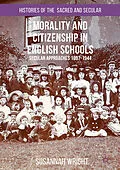This book sheds new light on early twentieth-century secularism by examining campaigns to challenge dominant Christian approaches to the teaching of morality and citizenship in English schools, and to offer superior alternatives. It brings together, for the first time, the activities of different educators and pressure groups, operating locally, nationally and internationally, over a period of 47 years. Who were these activists? What ideological and organisational resources did they draw on? What proposals did they make? And how did others respond to their views? Secularist activists represented a minority, but offered a recurrent challenge to majority views and shaped ongoing educational debates. They achieved some, albeit limited, influence on policy and practice. They were divided among themselves and by 1944 had failed to supplant majority views. But, with the place of religious and secular ideals in schools remaining a subject of debate, this analysis has resonance today.
Autorentext
Susannah Wright is Senior Lecturer in Education Studies at Oxford Brookes University, UK. She has published on secularism, morality and citizenship in English schools, and on local case studies of educational and welfare provision. This is her first monograph. She is a co-editor of the journal History of Education.
Inhalt
Chapter 1: Introduction.- Chapter 2: Religion, Secularism and Education.- Chapter 3: Moral Instruction in the Provinces: FJ Gould in Leicester.- Chapter 4: The Moral Instruction League 18971919.- Chapter 5: International Dimensions of Moral Education 18921914.- Chapter 6: The Positivist World Citizen: FS Marvin and FJ Gould in the League of Nations Union 191939.- Chapter 7: The Faith of the Democrat: the Association for Education in Citizenship 193444.- Chapter 8: Conclusion.
